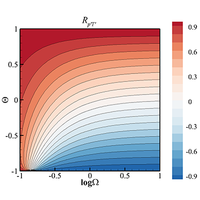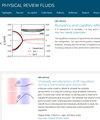Correlations between thermodynamic fluctuations in shock wave/turbulent boundary layer interaction
IF 2.5
3区 物理与天体物理
Q2 PHYSICS, FLUIDS & PLASMAS
引用次数: 0
Abstract
The second moment correlations between thermodynamic fluctuations in incident shock wave/turbulent boundary layer interaction flows at Mach 2.25 are systematically investigated by direct numerical simulation. The concerned fluctuations are those of pressure, entropy, temperature, and density . Effects of wall temperature and Reynolds number are studied. Kovásznay decomposition is introduced to decompose the fluctuations into acoustic and entropic modes. It is shown that all the six concerned correlations are determined by merely two parameters, which are interpreted as intermodal competition and intermodal correlation, respectively. Accordingly, the flow field is divided into several zones, each with distinct physical properties, to analyze the contributing factors to the correlations. In addition, a model is proposed where the correlations are deemed as functions of the root-mean-square values of thermodynamic fluctuations, as in Gerolymos and Vallet [J. Fluid Mech. 851, 447 (2018)] but simpler. The formula for each correlation has the same form. The accuracy of the model is validated in boundary layers where the intermodal correlation is weak.

冲击波/湍流边界层相互作用中热力学波动之间的相关性
通过直接数值模拟,系统地研究了马赫数为 2.25 的入射冲击波/湍流边界层相互作用流中热力学波动的第二矩相关性。相关波动包括压力、熵、温度和密度 {p′,s′,T′,ρ′}。研究了壁温和雷诺数的影响。引入 Kovásznay 分解法将波动分解为声学模式和熵模式。结果表明,所有相关的六种相关性仅由两个参数决定,这两个参数分别被解释为模式间竞争和模式间相关性。因此,将流场划分为几个区域,每个区域都具有不同的物理特性,以分析相关性的促成因素。此外,还提出了一个模型,将相关性视为热力学波动均方根值的函数,如 Gerolymos 和 Vallet [J. Fluid Mech. 851, 447 (2018)],但更为简单。每种相关性的公式形式相同。模型的准确性在模式间相关性较弱的边界层中得到了验证。
本文章由计算机程序翻译,如有差异,请以英文原文为准。
求助全文
约1分钟内获得全文
求助全文
来源期刊

Physical Review Fluids
Chemical Engineering-Fluid Flow and Transfer Processes
CiteScore
5.10
自引率
11.10%
发文量
488
期刊介绍:
Physical Review Fluids is APS’s newest online-only journal dedicated to publishing innovative research that will significantly advance the fundamental understanding of fluid dynamics. Physical Review Fluids expands the scope of the APS journals to include additional areas of fluid dynamics research, complements the existing Physical Review collection, and maintains the same quality and reputation that authors and subscribers expect from APS. The journal is published with the endorsement of the APS Division of Fluid Dynamics.
 求助内容:
求助内容: 应助结果提醒方式:
应助结果提醒方式:


